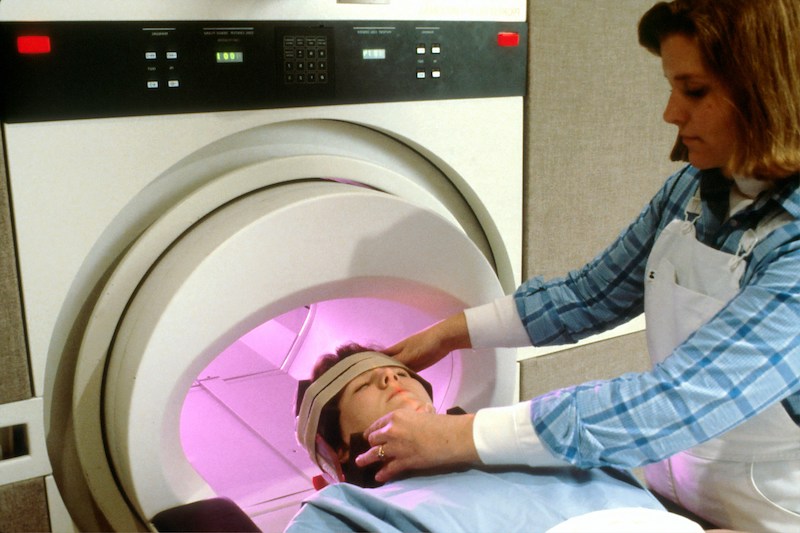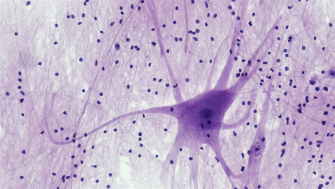How can you test if you have Alzheimer’s in the Netherlands?
Last updated: 04 December 2024

You can legally access new medicines, even if they are not approved in your country.
Learn howIf you feel that your memory is getting worse or that you're showing other signs of cognitive decline, there are ways to get tested for Alzheimer's in the Netherlands. Here, you'll learn all you need to know about where and how to check whether you might have Alzheimer's. Including the potential benefits of an early diagnosis.
How is Alzheimer's diagnosed?
Usually, the first signs of Alzheimer's you or your family will notice are related to memory problems and difficulty with daily activities. A lot of these symptoms can be the same in other types of dementia, and they alone are not sufficient to confirm a diagnosis.
Other indicators, such as the presence of high levels of beta-amyloid and tau in the brain, are needed to complete the diagnostic picture.
If you're worried about testing for Alzheimer's, knowing what to look out for can help you get the right support on time.
What is the difference between dementia and Alzheimer's?
Though the terms are often used interchangeably, dementia and Alzheimer's are not the same condition. There are many types of dementia, and Alzheimer's is just one of them (though the most common one). Some of the other types of dementia are Lewy body dementia, frontotemporal dementia, and vascular dementia 1.
In other words, Alzheimer's is a specific type of dementia, with a different set of symptoms and progression. Alzheimer's tends to affect either the left or the right side of the brain first. Other types of dementia can be more random and can present very differently in terms of behavior 1.
What are the early symptoms of Alzheimer's?
Common signs of Alzheimer's include:
-
Memory loss: Forgetting recent information, dates, or events, and repeating questions.
-
Difficulty planning or solving problems: Struggling with tasks like paying bills or following a recipe.
-
Confusion with time or place: Losing track of dates and forgetting how you arrived somewhere.
-
Trouble with words: Difficulty finding words, following conversations, or using the wrong names for objects.
-
Personality changes: Becoming anxious, suspicious, or withdrawn from social activities.
What should you do if you suspect you have Alzheimer's?
The first thing to remember is that diagnosing Alzheimer's requires a variety of tests. Memory problems alone are not sufficient to confirm the condition. If you suspect you may have Alzheimer's, you should talk to your GP first and explain your symptoms. They will be able to help you navigate the Dutch process for testing whether you have Alzheimer's.
Where can you get tested for Alzheimer's in the Netherlands?
If you're concerned about your memory or behavior, you should visit your general practitioner (GP). He or she may decide to refer you for further testing in a hospital.
The role of your GP
The GP will ask questions about your symptoms and assess your memory function. A urine and blood test may also be done to rule out other causes, such as medication issues, hormonal imbalances, stress, vitamin deficiency, or depression. If Alzheimer's is suspected, the GP may perform an MMSE test. It gives a general sense of memory and cognitive skills but doesn't provide a diagnosis.
If further investigation is necessary, the GP will consult with someone close to you. For example, a spouse, sibling, or friend. They will want to gather more information about your memory and behavior changes.
If the initial tests are inconclusive, the GP may refer you to a hospital specialist. They will conduct more detailed cognitive and neurological tests. Possibly, including an MRI, which can help determine a diagnosis.
Testing for Alzheimer's in the hospital
If your GP recommends further diagnostic testing for Alzheimer's in the hospital, these are the tests you can expect. You may be referred for some or all of them, depending on your doctor's recommendation.
-
Neuropsychological tests
Neuropsychological testing is used to assess cognitive functions, such as memory, language, and planning abilities. The test consists of various tasks and questions, some easy and others more challenging. They aim to measure your cognitive level compared to people of the same age, gender, and education.
The benefit of this test is that it helps identify specific cognitive issues, such as whether memory complaints stem from memory problems or concentration difficulties. It also determines if dementia is present and how severe it is. However, some patients may find the test confronting, as it reveals areas of cognitive decline. The test can also be tiring due to its length 2.
-
Brain scans (MRI/CT)
Brain scans, such as MRI or CT, are commonly used in diagnosing Alzheimer's. These scans allow doctors to see the brain and rule out treatable conditions. They also help detect signs of dementia like brain shrinkage or blood vessel damage.
The advantage of these scans is that they help identify treatable issues like brain tumors, strokes, or hemorrhages, and reveal dementia-related changes. MRI provides more detail than CT. However, it requires patients to lie still for about 30 minutes, which can be challenging in some cases. CT scans are quicker and less restrictive but show fewer details compared to MRI 2.
-
Cerebrospinal fluid (CSF) testing
Cerebrospinal fluid (CSF) testing can detect Alzheimer’s proteins, which cannot be seen on MRI or CT scans. The presence of these proteins indicates a higher risk of developing Alzheimer’s, and the test is done through a lumbar puncture.
The benefit is that a normal result can rule out Alzheimer’s, although other forms of dementia are still possible. This test can also detect Alzheimer’s early, especially in younger people where the disease may present differently.
However, the procedure can cause discomfort, and abnormal protein levels don’t guarantee Alzheimer’s—just a higher risk 2.
-
Amyloid PET scan
Amyloid PET scans are not part of standard diagnostic procedures, but they can detect Alzheimer’s proteins in the brain.
The advantage is that a normal result can rule out Alzheimer’s, though other types of dementia may still be possible. Amyloid PET scans can also identify Alzheimer’s in its early stages and distinguish it from other dementias, particularly in younger people. However, an abnormal result doesn’t guarantee Alzheimer’s. It simply indicates a higher risk, which can be confusing 2.
Genetic factors and heredity in Alzheimer's
A lot of people whose parents or other family members have suffered from Alzheimer's worry about inheriting the disease or passing it on to their children. Is Alzheimer's hereditary?
Can Alzheimers run in the family?
Alzheimer’s disease can sometimes run in families, but in most cases, it is not caused by a single gene. While genetic factors can increase or decrease the risk of Alzheimer's, lifestyle and environmental factors also play a significant role.
Some genetic variants, like the APOE gene, are well-studied. APOE ε4 increases Alzheimer's risk, while APOE ε2 may offer some protection. Still, even if someone has a family history of Alzheimer’s, they may not necessarily develop the disease, and vice versa 3.
In rare cases (less than 3%), Alzheimer’s is caused by mutations in specific genes (APP, PSEN1, and PSEN2). In these cases, it can be passed down in families, leading to early-onset Alzheimer’s, often before the age of 65 3.
Can you get tested for the Alzheimer's gene?
Genetic testing for the gene mutations associated with Alzheimer's is available. However, it is typically only recommended for those with a strong family history and early symptoms.
The benefit of testing is gaining more information about the disease's heredity, medical follow-ups, and certainty about the presence of the gene. This may influence important life decisions like work, relationships, or having children. However, most cases do not reveal a gene, and some people may feel guilty if they do not carry the gene while relatives do.
If you're eligible for DNA testing, you can decide whether and when to undergo testing in the Netherlands 2.
Are there blood tests for Alzheimer's?
Yes, there is a promising blood test for Alzheimer’s that can detect the disease with greater accuracy than most doctors. It has the potential to reduce the need for invasive tests.
Research from Amsterdam UMC's Neurochemisch Lab and Alzheimercentrum Amsterdam has developed a method to interpret blood test results. It allows for simpler and cheaper diagnosis compared to lumbar punctures or PET scans.
This new method, led by Inge Verberk and Charlotte Teunissen, measures specific Alzheimer-related proteins in the blood. Currently, the blood test is being trialed, with the aim to make it a standard diagnostic tool in Dutch memory clinics 4.
At the moment, the test is only reliable for patients who are showing symptoms. Further research is needed to assess its effectiveness across different populations.
The benefits of early Alzheimer's diagnosis
Early diagnosis of Alzheimer’s disease offers numerous benefits.
A timely diagnosis allows you to access vital information, and support. Additionally, an early diagnosis empowers you to plan for the future, make necessary adjustments in your work and personal lives. By participating in early-stage support groups, you can connect with others facing similar challenges, sharing valuable coping strategies and experiences.
Importantly, early diagnosis can also make more treatment options available for you. While there is no cure (yet) for the condition, there are new medicines that can potentially slow the progression of the disease. However, they are only applicable in the early stages of Alzheimer's.
Medicines for early-stage Alzheimer's
If you're aware of your diagnosis early on, your doctor may be able to prescribe medicines to help manage symptoms or potentially slow down disease progression. Some such medicines are:
-
Cognitive enhancers, such as galantamine, donepezil, and rivastigmine
These medicines increase the level of acetylcholine, a neurotransmitter involved in memory and learning. By doing so, they help improve symptoms. According to the World Alzheimer Report, cognitive enhancers are considered effective interventions in early Alzheimer's 5.
-
New medicines against Alzheimer's (lecanemab and donanemab)
While not available in the Netherlands yet, lecanemab and donanemab are two of the latest medicines in the world against Alzheimer's. They are both anti-amyloid therapies, aiming to remove beta-amyloid plaques in the brain, thus slowing down cognitive decline.
As of December 2024, only lecanemab is (almost) approved for use in the EU, while both donanemab and lecanmeab are approved in the UK. However, if your doctor is of the opinion that they could benefit you, they can prescribe them. And with a prescription, you can get the medicines in the Netherlands and start your treatment.
For more information, get in touch with our expert team.
Testing for Alzheimer's in the Netherlands: better sooner than later
Testing for Alzheimer’s in the Netherlands is essential is you're facing memory loss or cognitive decline. Reach out to your GP to get the process started and better understand your condition. With mutliple tests available, including new blood tests for Alzheimer's, there are diagnostic options that aren't necessarily invasive.
Early detection is important, as it can help connect you with necessary resources and support. It can also open up treatment options that may slow disease progression and that won't be as effective at later stages of Alzheimer's. While there is currently no cure, an early diagnosis can improve your quality of life and help with future planning.
If you suspect you may have Alzheimer’s, reach out to your doctor. Sooner is better than later.
References:
- Sievert, Diane. Alzheimer's Vs Dementia - What's The Difference?, UCLA Medical School, 26 June 2023.
- Diagnostische testen. Alzheimercentrum Amsterdam, Accessed 22 October 2024.
- Sheet | National Institute on Aging. National Institute on Aging, 1 March 2023.
- Nieuwe methode ontwikkeld voor interpretatie bloedtest alzheimer. Alzheimercentrum Amsterdam, Accessed 22 October 2024.
- The benefits of early diagnosis and intervention. Alzheimer's Disease International, Accessed 22 October 2024.




